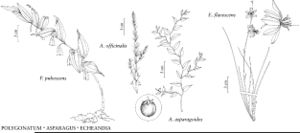Difference between revisions of "Asparagus officinalis"
Sp. Pl. 1: 313. 1753.
FNA>Volume Importer |
imported>Volume Importer |
||
| (5 intermediate revisions by 2 users not shown) | |||
| Line 8: | Line 8: | ||
}} | }} | ||
|common_names=Garden asparagus;common asparagus | |common_names=Garden asparagus;common asparagus | ||
| + | |special_status={{Treatment/ID/Special_status | ||
| + | |code=W2 | ||
| + | |label= | ||
| + | }}{{Treatment/ID/Special_status | ||
| + | |code=I | ||
| + | |label=Introduced | ||
| + | }}{{Treatment/ID/Special_status | ||
| + | |code=F | ||
| + | |label=Illustrated | ||
| + | }} | ||
|basionyms= | |basionyms= | ||
|synonyms= | |synonyms= | ||
| Line 24: | Line 34: | ||
|elevation=0–2500 m | |elevation=0–2500 m | ||
|distribution=St. Pierre and Miquelon;Alta.;B.C.;Man.;N.B.;Nfld. and Labr.;N.S.;Ont.;P.E.I.;Que.;Sask.;Ala.;Ariz.;Ark.;Calif.;Colo.;Conn.;Del.;D.C.;Fla.;Ga.;Idaho;Ill.;Ind.;Iowa;Kans.;Ky.;La.;Maine;Md.;Mass.;Mich.;Minn.;Miss.;Mo.;Mont.;Nebr.;Nev.;N.H.;N.J.;N.Mex.;N.Y.;N.C.;N.Dak.;Ohio;Okla.;Oreg.;Pa.;R.I.;S.C.;S.Dak.;Tenn.;Tex.;Utah;Vt.;Va.;Wash.;W.Va.;Wis.;Wyo.;Europe;Asia;n Africa;naturalized in temperate regions worldwide. | |distribution=St. Pierre and Miquelon;Alta.;B.C.;Man.;N.B.;Nfld. and Labr.;N.S.;Ont.;P.E.I.;Que.;Sask.;Ala.;Ariz.;Ark.;Calif.;Colo.;Conn.;Del.;D.C.;Fla.;Ga.;Idaho;Ill.;Ind.;Iowa;Kans.;Ky.;La.;Maine;Md.;Mass.;Mich.;Minn.;Miss.;Mo.;Mont.;Nebr.;Nev.;N.H.;N.J.;N.Mex.;N.Y.;N.C.;N.Dak.;Ohio;Okla.;Oreg.;Pa.;R.I.;S.C.;S.Dak.;Tenn.;Tex.;Utah;Vt.;Va.;Wash.;W.Va.;Wis.;Wyo.;Europe;Asia;n Africa;naturalized in temperate regions worldwide. | ||
| + | |introduced=true | ||
|discussion=<p>Eaten as a vegetable, <i>Asparagus officinalis</i> has been widely cultivated for its young shoots since ancient Greek times. The species is naturalized in many temperate climates. Mature asparagus has caused poisoning in cattle (J. M. Kingsbury 1964). Young plants can cause dermatitis, and the red berries are suspected of poisoning humans (E. M. Schmutz and L. B. Hamilton 1979). The species is dioecious (J. E. Lazarte and B. F. Palser 1979), and homomorphic sex chromosomes have been identified (H. Loptien 1979).</p> | |discussion=<p>Eaten as a vegetable, <i>Asparagus officinalis</i> has been widely cultivated for its young shoots since ancient Greek times. The species is naturalized in many temperate climates. Mature asparagus has caused poisoning in cattle (J. M. Kingsbury 1964). Young plants can cause dermatitis, and the red berries are suspected of poisoning humans (E. M. Schmutz and L. B. Hamilton 1979). The species is dioecious (J. E. Lazarte and B. F. Palser 1979), and homomorphic sex chromosomes have been identified (H. Loptien 1979).</p> | ||
|tables= | |tables= | ||
| Line 33: | Line 44: | ||
-->{{#Taxon: | -->{{#Taxon: | ||
name=Asparagus officinalis | name=Asparagus officinalis | ||
| − | |||
|authority=Linnaeus | |authority=Linnaeus | ||
|rank=species | |rank=species | ||
| Line 48: | Line 58: | ||
|publication title=Sp. Pl. | |publication title=Sp. Pl. | ||
|publication year=1753 | |publication year=1753 | ||
| − | |special status= | + | |special status=W2;Introduced;Illustrated |
| − | |source xml=https:// | + | |source xml=https://bitbucket.org/aafc-mbb/fna-data-curation/src/2e0870ddd59836b60bcf96646a41e87ea5a5943a/coarse_grained_fna_xml/V26/V26_368.xml |
|genus=Asparagus | |genus=Asparagus | ||
|species=Asparagus officinalis | |species=Asparagus officinalis | ||
Latest revision as of 22:14, 5 November 2020
Herbs, erect, 1–2.5 m; rhizomes fibrous. Stems annual, densely branched distally; branches finely dissected, ascending to perpendicular, unarmed; cladophylls in clusters of (2–)4–15(–25) per node, filiform, straight or curved, 1–3 cm. Leaves scalelike, 3–4 mm; blade lanceolate, base hardened. Inflorescences in axillary racemes, 1–3-flowered. Flowers some unisexual; perianth campanulate, yellow or yellowish green; tepals connate 1–2 mm, greenish white, 3–8 × 1–2 mm; pedicel 8–12 mm, jointed at or above middle. Berries red, 6–10 mm. Seeds 2–4. 2n = 20, 40.
Phenology: Flowering summer.
Habitat: Fields, fencerows, roadsides, disturbed areas
Elevation: 0–2500 m
Distribution
Introduced; St. Pierre and Miquelon, Alta., B.C., Man., N.B., Nfld. and Labr., N.S., Ont., P.E.I., Que., Sask., Ala., Ariz., Ark., Calif., Colo., Conn., Del., D.C., Fla., Ga., Idaho, Ill., Ind., Iowa, Kans., Ky., La., Maine, Md., Mass., Mich., Minn., Miss., Mo., Mont., Nebr., Nev., N.H., N.J., N.Mex., N.Y., N.C., N.Dak., Ohio, Okla., Oreg., Pa., R.I., S.C., S.Dak., Tenn., Tex., Utah, Vt., Va., Wash., W.Va., Wis., Wyo., Europe, Asia, n Africa, naturalized in temperate regions worldwide.
Discussion
Eaten as a vegetable, Asparagus officinalis has been widely cultivated for its young shoots since ancient Greek times. The species is naturalized in many temperate climates. Mature asparagus has caused poisoning in cattle (J. M. Kingsbury 1964). Young plants can cause dermatitis, and the red berries are suspected of poisoning humans (E. M. Schmutz and L. B. Hamilton 1979). The species is dioecious (J. E. Lazarte and B. F. Palser 1979), and homomorphic sex chromosomes have been identified (H. Loptien 1979).
Selected References
None.
